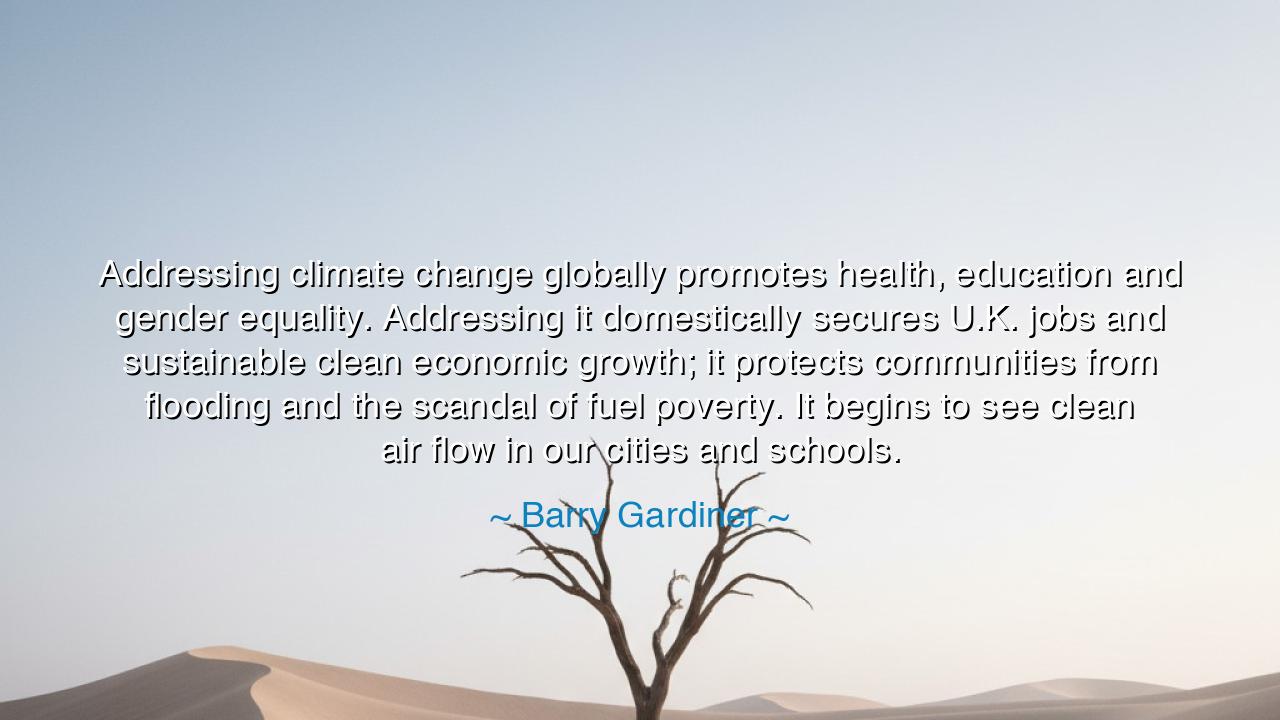
Addressing climate change globally promotes health, education and
Addressing climate change globally promotes health, education and gender equality. Addressing it domestically secures U.K. jobs and sustainable clean economic growth; it protects communities from flooding and the scandal of fuel poverty. It begins to see clean air flow in our cities and schools.






Hear the words of Barry Gardiner, a statesman who gazed not only upon his nation but upon the world, and declared: “Addressing climate change globally promotes health, education, and gender equality. Addressing it domestically secures U.K. jobs and sustainable clean economic growth; it protects communities from flooding and the scandal of fuel poverty. It begins to see clean air flow in our cities and schools.” These words are not mere policy—they are prophecy. They are a reminder that the stewardship of the Earth is not the work of economists or politicians alone, but the sacred duty of humankind. Gardiner speaks as one who has seen the truth: that the fate of nations and the fate of nature are bound together as body and soul.
In his declaration lies the wisdom of the ancients — the understanding that the Earth is both cradle and covenant. When the soil is poisoned, so too is the spirit of the people. When the air grows thick with smoke, the heart grows heavy with despair. Gardiner’s words echo the law written in the heart of creation itself: that to preserve balance in the natural world is to preserve balance within ourselves. He reminds us that to act on climate change is not simply to save glaciers or forests, but to protect the dignity of the poor, the health of the young, and the promise of the future.
He speaks of global action first — for the winds of the Earth know no borders. What burns in one nation drifts to another; what melts in the poles floods the lands of the distant equator. When the powerful exploit and the vulnerable endure the cost, justice withers. Thus, addressing climate change globally becomes a work of equality itself — for clean water, fertile soil, and safe air are not privileges, but rights. In places where drought drives children from school and famine deepens the chains of gender inequality, the fight for the planet is also the fight for human freedom. Gardiner’s vision reminds us that the healing of the world begins not in isolation, but in unity.
And when he turns to domestic action, his tone becomes both practical and visionary. For every nation, he says, must first tend its own house. By investing in clean energy and sustainable growth, the people of the United Kingdom — and all peoples — secure their future. Jobs born of innovation, not exploitation; growth that strengthens, not depletes — this is the promise of a civilization that finally learns to live in harmony with its home. To protect communities from flooding is not only to build stronger walls, but to honor the lives that stand behind them. To end the scandal of fuel poverty is to ensure that warmth, that simplest comfort of life, is not the privilege of the few but the right of all.
History too bears witness to this truth. In the time of King Ashoka, after his conquests, the emperor turned his heart toward peace and the welfare of the Earth. He ordered the planting of trees along roads, the digging of wells, the protection of animals, and the education of the people — seeing in these acts the true strength of his empire. Like Ashoka, Gardiner reminds us that greatness is not found in conquest, but in care — that a nation is most powerful when it guards not only its people, but its planet. For the empire that cannot protect its air, its water, its soil, will in time rule only over dust.
When Gardiner envisions clean air flowing through cities and schools, his words take on a sacred softness. The image is almost Edenic — the renewal of breath, the purity of life restored. To breathe without harm should never be a privilege; it is the essence of existence itself. Imagine, he asks us, children running in playgrounds free from pollution, the elderly walking streets lined with green, the rivers clear enough to mirror the sky. This is not fantasy; it is the fruit of courage — the courage to choose sustainability over short-term gain, and justice over convenience.
Let this teaching, then, be etched in the minds of those who listen: the Earth does not belong to us; we belong to the Earth. Every act of destruction we permit is a wound upon our own souls, and every act of preservation is a step toward redemption. To heal the planet is to heal ourselves. Let each of us plant where we can, conserve what we can, speak when others fall silent. Let governments be judged not by the wealth they hoard, but by the world they leave to their children.
For as Barry Gardiner teaches, the work of confronting climate change is not a choice — it is an imperative. To delay is to deny life itself. And when clean air once again flows through our cities, when floods recede and children breathe safely beneath open skies, we will know that humankind has finally remembered its oldest and most sacred duty: to guard the Earth, our mother and our home.






AAdministratorAdministrator
Welcome, honored guests. Please leave a comment, we will respond soon